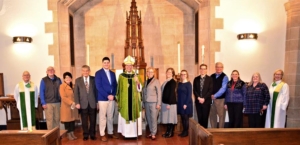Principles and Membership
Belief and Practice
Episcopalians follow Jesus Christ, as Lord and Savior. We believe in the relational and communal nature of God as it is expressed through the three-fold experience of the first Christians of the God of Israel, the experience of Jesus, and the empowerment of the spirit of the risen Christ after his ascension. This three-fold experience was later articulated in the historic doctrine of the Holy Trinity.
Episcopalians put their faith in God revealed through scripture, tradition, and human reason – all three of which are held in dynamic tension with one another with no single element being more important than the other two. Episcopalians uphold the Bible as the inspired witness to God’s ancient covenant with Israel and the new covenant inaugurated through the death and resurrection of Jesus Christ.
The Episcopal Church is part of the Anglican transmission of historic, catholic and apostolic Christianity, and therefore affirms the faith contained in the historic creeds and doctrines of the Ecumenical Councils of the Christian Church and the Reformation era Articles of Religion, now found on page 864 of The Book of Common Prayer.
The ministry of the Episcopal Church affirms the historic order of bishop, priest, and deacon. In contrast to other parts of the catholic and apostolic tradition, the Episcopal Church ordains both men and women, homosexual as well as heterosexual, and all its clergy are permitted to marry.
In the Episcopal Church, worship is the primary activity of the community gathered as the Body of Christ. The Episcopal Church defines its boundaries by reference to common worship rather than shared belief. Anyone is welcome who agrees to worship with us according to the rites of the Book of Common Prayer. Right belief tends to divide people into those who are in, and those who are out. By contrast, worship stresses being in right relationship with one another. The Book of Common Prayer, sometime referred to as the Bible reorganized for worship guides common worship in the Eucharist, in the daily offices of common prayer, and in other celebrations of Christian life.
Episcopalians articulate their Christian lives through the five promises of the Baptismal Covenant found on page 304 of The Book of Common Prayer. These are summarized here as: to be faithful in prayer and worship; to resist evil and repent when we fail; to proclaim in word and example the good news of the Gospel of Christ; to seek Christ in all persons; to strive for justice and peace among all, respecting the dignity of every human being.
Membership
The Episcopal Church takes seriously Archbishop Temple’s dictum: the Church is the only organization that exists for those who are not its members. Therefore, it is possible to be a member of St. Martin’s Parish without being a formal member of the Episcopal Church.
You are considered a member of St. Martin’s if committing yourself to being regular in worship, you support the life of the community through your gifts of time, talent and treasure. Baptism is not a prerequisite at this stage of membership but an intention to grow towards baptism is strongly encouraged.
Formal Membership in the wider Episcopal Church is through baptism and confirmation. Confirmation is the affirmation of baptismal promises for young people growing-up in an Episcopal church and for adults coming from non-Apostolic (Protestant) Christian traditions who wish to become formal members of the Episcopal Church. Reception is a similar ceremony for adults coming from Apostolic (Catholic, Lutheran, Moravian, and Orthodox) Christian traditions.
For more additional on membership and becoming part of the Christian life of St. Martin’s please contact: The Rector – Mark Sutherland

